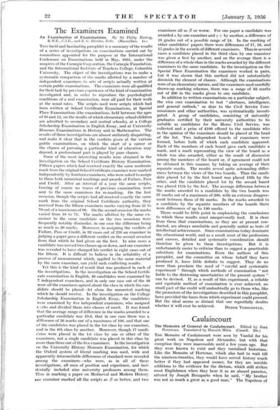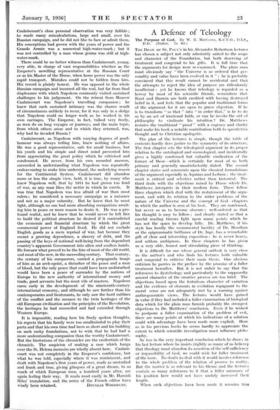Caulaincourt
THE Memoirs of Caulaincourt were seen by Vandal for his great work on Napoleon and Alexander, but with that exception they were inaccessible until a few years ago. But they were known to exist and they tantalised historians. Like the Memoirs of Hortense, which also had to wait till the nineteen-twentiei, they would have served history much better if they had appeared sooner, for they are notable additions to the evidence for the dictum, which still strikes most Englishmen when they hear it as an absurd paradox, uttered by Joseph Bonaparte when he said, "My brother Was not So much a great as a good man." The Napoleon of Caulaincourt's close personal observation was very fallible ; he made many miscalculations, large and small, over his Russian campaign, and he did not like to face or admit them. His conceptions had grown with the years of power and the Grande Armee was a numerical high-water-mark; but it was not controlled by a man whose genius was still at high- water-mark.
. There could be no better witness than Caulaincourt, young, very able, in charge of vast responsibilities whether as the Emperor's unwilling representative at the Russian Court or as his Master of the Horse, when horse power was the onlr. rapid transport. Mistakes could not be hidden from him. His record is plainly honest. He was opposed to the whole Russian campaign and incurred all the real, but far from final displeasure with which Napoleon commonly visited sustained challenges to his judgement. On the retreat from Moscow Caulaincourt was Napoleon's travelling companion ; he knew that such sustained intimacy was the chance result of circumstances unlikely to recur, for it was only in a sledge that Napoleon could no longer work as he worked in his own carriages. The Emperor, in fact, talked very freely, as men do on long voyages or journeys, and the main topic, from which others arose and to which they returned, was, why had he invaded Russia ?
Caulaincourt, as Napoleon with varying degrees of good- humour was always telling him, knew nothing of affairs. He was a good representative, safe for small business, but his youth and his simple and direct mind prevented him from appreciating the great policy which he criticised and condemned. He never, from his own recorded answers, succeeded in understanding what Napoleon was repeatedly endeavouring to make him understand, the underlying reason for the Continental System. Caulaincourt did abandon more or less the simple view, held, it is true, by many who knew Napoleon well, that by 1811 he had grown too fond of war, as any man likes the metier in which he excels. It was true that Napoleon was less afraid of war than most rulers ; he considered a necessary campaign as a nuisance and not as a major calamity. But he knew that he must fight, although no one had more absorbing occupations await- ing him in peace or more reason to desire it. He was a pro- found realist, and he knew that he would never be left free to build the political structure he desired if it contradicted the economic and financial structure by which the great commercial power of England lived. He did not exclude English goods as a mere reprisal of war, but because they meant a growing dependence, a slavery of debt, and the passing of the keys of national well-being from the dependent country's apparent Government into alien and soulless hands. He foresaw what proved to be the fate of most of the old world, and most of the new, in the succeeding century. That century, the century of his conquerors, carried a propaganda image of him as an arch-egoist, a disturber of the peace and a man of blood, but the only peace that could have been undisturbed would have been a peace of surrender by the nations of Europe to the new authority of international money and trade, good servants but the most vile of masters. Napoleon came early in the development of the nineteenth-century international economy, and although he saw further than his contemporaries and lieutenants, he only saw the hard outlines of the conflict and the menace to the twin heritages of the old European civilisation and the principles of the Revolution, the heritages he had reconciled and had extended through Western Europe.
It is impossible, reading here his freely spoken thoughts, his regrcts that his family were too smallminded to play their parts and that his own time had been so short and his building on such rocky foundations, not to wish that he had had a more understanding companion than the worthy Caulaincourt. But the limitations of the chronicler are the credentials of the chronicle. The suspicion of making a case which hangs over the St. Helena memoirs are wholly absent here. Caulain- court was not completely in the Emperor's confidence, but what he was told, especially where it was reminiscent, and dealt with Napoleon's first years of power, reads as unstudied and frank and true, giving glimpses of a great dream, to so much of which European men, a hundred years after, are again feeling their way. It reads most easily in Mr. Hamish Miles' translation, and the notes of the French editor have











































 Previous page
Previous page